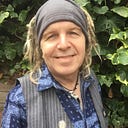Member-only story
Paranoia’s Poison Door
To be paranoid is to be human, especially today
All the terrorist atrocities of recent years must surely have ratcheted up our collective state of paranoia. Even ‘getting away from it all’ to some exotic, sun kissed beach is no longer safe. Fear and loathing stalks our consciousness.
Since the 1990s paranoia is no longer considered to be exclusive to a mental health diagnosis. Studies have shown that around 25% of us have regular paranoid thoughts. That is, unfounded fears that someone is out to harm us. Compare this to the 1% who experience paranoia as a symptom of schizophrenia. Paranoia has now come of age, identified as phenomena that reaches far beyond the boundaries of a clinical diagnosis to become part of the human condition.
The philosopher, Paul Ricouer, coined the phrase ‘the hermeneutics of suspicion’ that we all live our lives under. The triumvirate of Freud, Marx and Nietzche unmasked our false consciousness to reveal the ‘real’ from the ‘apparent’. For example, Nietzche revealed religion as the refuge of the weak, famously declaring that ‘God is dead.’ Marx saw religion as an escape from intolerable working conditions and means for the bosses to manipulate their workers and keep them compliant; ‘the opium of the people’. Freud maintained that ‘religion is a system of wishful illusions together with a…
